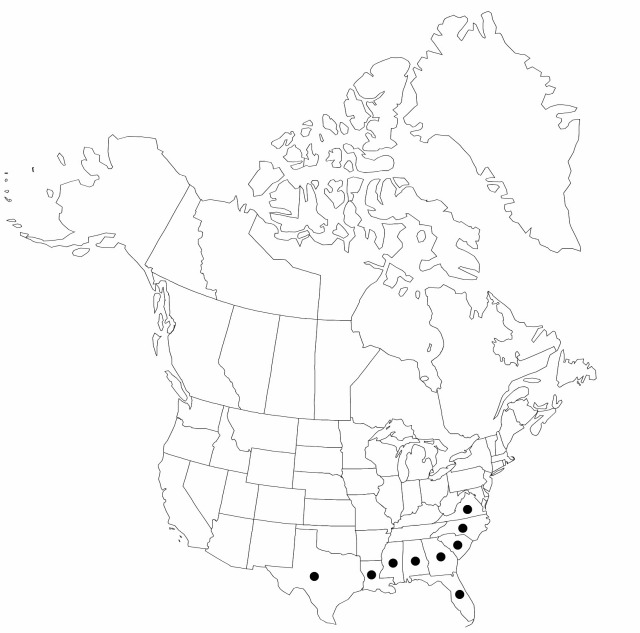Difference between revisions of "Fuirena breviseta"
Bull. Torrey Bot. Club 28: 466. 1901.
FNA>Volume Importer |
imported>Volume Importer |
||
| (3 intermediate revisions by 2 users not shown) | |||
| Line 6: | Line 6: | ||
|place=28: 466. 1901 | |place=28: 466. 1901 | ||
|year=1901 | |year=1901 | ||
| + | }} | ||
| + | |special_status={{Treatment/ID/Special_status | ||
| + | |code=W1 | ||
| + | |label= | ||
| + | }}{{Treatment/ID/Special_status | ||
| + | |code=F | ||
| + | |label=Illustrated | ||
}} | }} | ||
|basionyms={{Treatment/ID/Basionym | |basionyms={{Treatment/ID/Basionym | ||
|name=Fuirena squarrosa var. breviseta | |name=Fuirena squarrosa var. breviseta | ||
|authority=Coville | |authority=Coville | ||
| + | |rank=variety | ||
|publication_title=Bull. Torrey Bot. Club | |publication_title=Bull. Torrey Bot. Club | ||
|publication_place=17: 6, plate 98, fig. 6. 1890 | |publication_place=17: 6, plate 98, fig. 6. 1890 | ||
| Line 36: | Line 44: | ||
-->{{#Taxon: | -->{{#Taxon: | ||
name=Fuirena breviseta | name=Fuirena breviseta | ||
| − | |||
|authority=(Coville) Coville | |authority=(Coville) Coville | ||
|rank=species | |rank=species | ||
| Line 50: | Line 57: | ||
|publication title=Bull. Torrey Bot. Club | |publication title=Bull. Torrey Bot. Club | ||
|publication year=1901 | |publication year=1901 | ||
| − | |special status= | + | |special status=W1;Illustrated |
| − | |source xml=https:// | + | |source xml=https://bitbucket.org/aafc-mbb/fna-data-curation/src/2e0870ddd59836b60bcf96646a41e87ea5a5943a/coarse_grained_fna_xml/V23/V23_47.xml |
|genus=Fuirena | |genus=Fuirena | ||
|species=Fuirena breviseta | |species=Fuirena breviseta | ||
Latest revision as of 20:41, 5 November 2020
Herbs perennial, cespitose, 20–50(–100) cm; rhizomes scaly; offshoots cormose. Culms tufted or close together, erect to leaning, smooth except in inflorescence. Leaves: proximal sheaths hispid-hirsute, median smooth, distal progressively shorter, smoother; principal blades toward midculm, linear to lance-linear, flat, 5–15 cm, smooth to sparsely strigose or puberulent, margins proximally or entirely spreading, hispid-ciliate. Inflorescences in clusters of terminal spikelets or from 1–2(–3) penultimate nodes, proximalmost involucral bract exceeding peduncle and cluster, distalmost shorter. Spikelets ovoid to cylindric, 10–15(–20) mm; fertile scales 3–3.5 mm; cusp excurved, length of scale; median ribs 3, strong. Flowers: perianth bristles incurved, mostly shorter than perianth stipe, mostly smooth; perianth blades short-oblong, ± equal to stipes, apex acute, strongly incurved, thickened distally, sometimes apiculate; anthers 3, 1–1.3 mm. Achenes: body trigonous, angles wirelike, faces lustrous brown or red-brown, 1 mm; beak linear, hispidulous at dilated tip. 2n = 46.
Phenology: Fruiting summer–fall.
Habitat: Inner edges of brackish marsh, bogs, wet flatwoods and savannas, ditches
Elevation: 0–200 m
Distribution

Ala., Fla., Ga., La., Miss., N.C., S.C., Tex., Va., West Indies (Cuba).
Discussion
Selected References
None.
